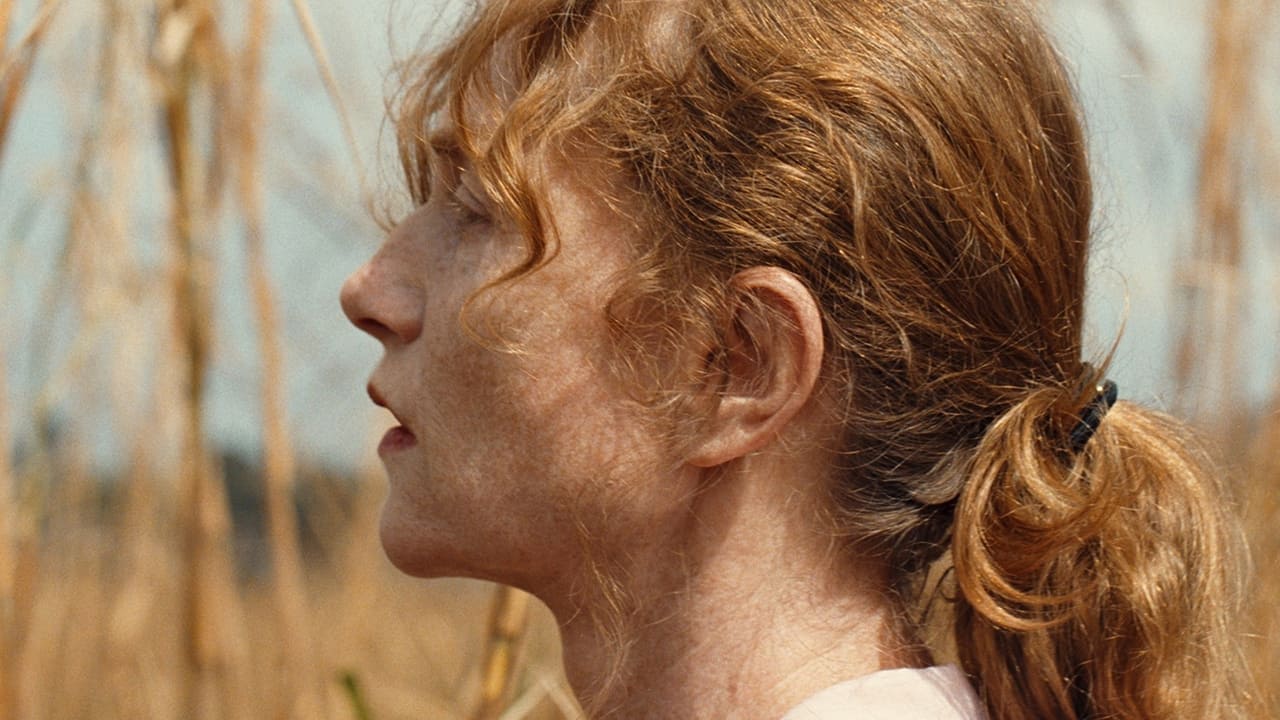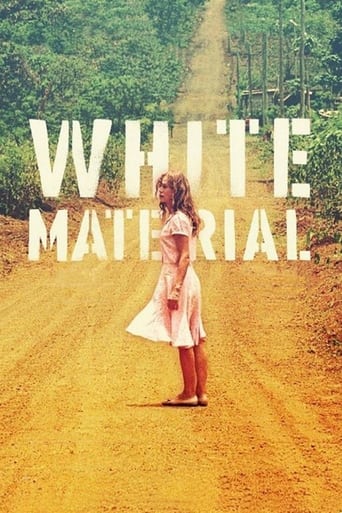

This Movie Can Only Be Described With One Word.
... View MoreHighly Overrated But Still Good
... View MoreBest movie ever!
... View MoreEach character in this movie — down to the smallest one — is an individual rather than a type, prone to spontaneous changes of mood and sometimes amusing outbursts of pettiness or ill humor.
... View MoreIn our daily lives, we use the word "identification" for variety of things that concern social and environmental factors. However, we really do not know what the identification means. Identification is a complicated progress that person never has a full control over this psychological situation. In Lacanian terms, identification can be considered as an instance of comprehension (Lacan J., Gallagher C., 2002). Any external factor can captivate the people to make it become their self-component. "White Material" is a must-see example for the identification issues with questioning colonization.Although of her French origin, Maria considers herself as an African person. She has left France and never desires to return. She herself disdains the white French people with saying "These dirty whites... They don't deserve this beautiful land.". It can be obviously seen that she does not perceive herself as a French, while the rebels and the army call her as one such "dirty white" who is responsible for the country's filthiness. Although all threats, Maria does not retreat her actions for the coffee plantation. When she decides to travel for finding new workers, she even does not want to take the rifle with her. She believes that no harm might occur because of her appeal, identifying herself as an African makes her think in that way. As events spread, it is more clear to everyone around Maria that the situation is turning into less secure and more dangerous. It is important to see that what home means and how it feels to belong in a situation where others mark you an outsider. Manuel also suffers from being white. After two African boys mess with him and cut off his hair, he shaves himself and joins the rebels. We can see that, there is an obvious identity confusion for Manuel who lives for many years in this land as a white people. His depression is a sign of vulnerability for his belongings. Joining rebels can be interpreted as his reaction to again himself and his family to unravel confusion about his identity.As we learn that the coffee plantation is established and owned by Maria's father. His wish is maintaining plantation by his family especially by his daughter, Maria. Plantation has been operated with African workers for years and it seems like a colonial symbol throughout the history. Since the first European colonies on African continent, plantations have been a major slavery places for the African black people. They are purchase by the plantation owners and they can be traded or sold as goods (Austin G., 2017). Although plantations are not operated in that way now, they offer still bad facilities for the African people. They are pushed to work in unacceptable conditions in different types of plantations. Because of that, Maria thinks her father as a root for dirtiness of white people and consequently colonization. In this manner, killing her own father reveals her anger and sorrow about the African people who are the slaves of the plantation. Hence, she wants to end this colonization by destroying the foundation of it. Like mentioned earlier, her father can be seen as a foundation. Feeling and identifying herself as an African sets up the idea of releasing her inner-self and showing where she belongs.
... View MoreI lived in Africa for nearly 25 years and, whenever things went south no matter whether with trivial or major consequences , a common response was "AWA," Africa Wins Again.Usually the reason some undertaking failed was attributable to human intransigence and stubborn refusal to be accommodative, but the results were similar to those experienced when a plantation or garden was left untended. Africa reclaimed the situation (or the plantation) and things quickly returned to it more "natural" state, as if any traces of human intervention had been fully erased.This story has to do with a multi-generational French family living in an unnamed African country, apparently for quite a long time, as a revolution is unfolding that is both anti-government and anti-exploitation-by-colonial-types like the family.Aside from the utter despair for all parties concerned, it's a little difficult to see what the point of the movie was. Maybe if we had seen a little of the main characters before the revolution, their slide into hopeless refugees-to-reality would have been more telling. As it is, from the start nearly everyone seems to have already found his or her own way to deny what's going on and the viewer is more likely to feel apathy for everyone rather than any sympathy.The "star" is a woman who apparently never owned a comb or hair brush or any clothes appropriate to her daily activities. Aside from a pile of greasy, stringy, uncontrollable, overly long hair, she is a pretty one-dimensional, forgettable character. In addition to being in total denial about what's going on about her, she also seems unaware that her "school boy" son has gone completely over the wall. At least he has the sense to shave his head, something I kept wishing the woman would do.If the objective was to show how Africa will always win again and reduce anyone and everything to the lowest common denominator (presumably taking the racist view that whites will be reduced to the lowest level ... that of native Africans ... if they let their guard down), then it failed remarkably. Just about everyone in the movie seemed to be rather pathetic from the start. It may be true that "Things Fall Apart," but for some things/people, that was a pretty small change.
... View More*Incoherence explainedAn un-paralled experience in double-confusion if one makes sure to hear director Denis' \"explanation\" of what the film is about, in the supplemental interview she gives. In relating her experience during pre-production references and then in explanations of why such-and-such happened during the filming itself one is led to understand why the film should be titled, \"White Material, or Incoherence Explained Incoherently.\" I suppose that the actual chaos of filming, with all the bureaucratic snafus and unusual technical shortcomings made the experience unusually \"thrilling\". This unplanned thrill was so pervasive, after the fact, that the temporary psychosis it produced made Ms. Denis and probably all deeply connected with the movie think that they had made a great film. *Anyone be willing to hazard a guess why Maria hacked her father-in-law to death?
... View MoreIsabelle Huppert (along with Helen Mirren, Juliette Binoche and Laura Linnie) is one of my five favorite actors (the only male on the list being Bill Murray), so I had no doubt that she could realistically play a colonial coffee farmer trying to hang on in soon-to-be post-colonial Africa.From the opening scene, there seems to be no doubt that things will turn out badly for Huppert's character. This is, after all, not war-torn Algeria portrayed in "Battle of Algiers", where the French are going to fight tenaciously to hold onto "their" land and then suddenly fold and get out of Dodge City. This is sub-Saharan Africa, and the politicians back in France know that it will be more profitable, and maybe even easier for them, to turn their colonies over to local African dictators, who can then be bought off for the benefit of French corporations and politicians. It's a win-win situation for everyone...except for the vast majority of Africans and Huppert's character. Perhaps we could let the French off the hook by saying that France couldn't have prepared their African colonies for independence if they had wanted to. But the French certainly did nothing positive in their colonies during their stay or after they left (the best we can say is that the Belgians in the Congo were much worst).This is life in the land of barely living, where the local African warlords have no background in or time for the niceties of "civilized" brutality and exploitation a la française. Huppert seems oddly out of place, a relatively nice colonist who perhaps thinks naively that she can trade on her relative niceness to survive the new and very ugly reality about to engulf her. But she is completely out of touch with the reality. She could choose to leave, unlike the Africans who work on her plantation. But she somehow thinks she has no choice but to stay even as child-soldiers wander across the countryside around here.I mainly saw "White Material" mainly because I like Isabelle Huppert acting, because one seldom sees a movie filmed in sub-Saharan Africa and because I had read Louroma's "Les Soleils des Indépendance" dealing with Ivory Coast. But I spent most of the movie hoping that when her time came, Huppert's character would take one carefully-aimed shot to head to relieve her suffering.A couple of other points. The Supplement interview with Claire Denis is well worth seeing (Isabelle Huppert's interview is okay; unfortunately the disk wouldn't let me watch the interview with Isaach de Bankolé). I was glad that the child-soldiers were not shown committing a lot of the violence in the film. And as Denis points out, the local actors were very good. I also know that not all African countries are the same, but I also wondered about whether there was a lot of violence against women during the conflict in Ivory Coast like is currently occurring every day in Congo. Still I was glad that violence against women was not shown; it wouldn't have added to the film's message or effect.
... View More